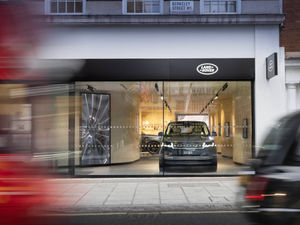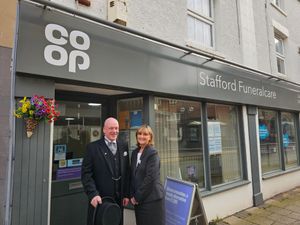Bank of England governor Mervyn King banks on Black Country sense
The smoke and flames of Black Country foundries made a lasting impression on Mervyn King as a child.
In a visit to the Black Country yesterday, Bank of England Governor Mervyn King spoke exclusively to Simon Penfold.
The smoke and flames of Black Country foundries made a lasting impression on Mervyn King as a child.
Today, the most powerful Governor of the Bank of England in living memory still sees himself as a Wolverhampton boy.
It was the town where he grew up, and where he developed his abiding love of cricket and football - in particular Aston Villa.
And it laid the groundwork for him to become a leading academic economist before he was recruited to the Bank of England, where he was appointed Governor in 2003.
He has faced the challenging job of trying to keep the British economy on an even keel during the most severe global recession since the War.
Despite some criticism, his reputation has emerged largely unscathed and the new Coalition Government has heaped new responsibilities on him, as it gave the Bank of England sweeping new powers over the UK's financial system to prevent another housing bubble or banking collapse.
But he is keen to dismiss any suggestions of personal power in his role, pointing out that all interest rate decisions are the result of a vote of the Bank's nine-member Monetary Police Committee — "I've been in the minority on three occasions," he points out.
He clearly sees himself as a team player, a legacy of the love of sport he gained as a pupil at Wolverhampton Grammar in the 1960s.
Mervyn King was nearly 10 when his family moved to Wolverhampton in the late 1950s, a result of his father becoming headmaster at a secondary modern in Lower Gornal. He first attended Warstones Primary, recalling it as "a really good school" where he passed the 11+ examination that took him to Wolverhampton Grammar — now one of the country's leading independents but then a state school.
"I had a very happy time growing up," he said."I went to a good school and had a lot of friends; played football, cricket and chess against other schools in the area."
At the time, the Black Country was dominated by manufacturing, leaving the young Mervyn with one of his strongest memories: "If you took the train from Wolverhampton to Birmingham in the late afternoon or early evening, particularly in the autumn or winter, all the way along the track you could see the flames and light from the furnaces making steel and the other metal bashing operations going on."
But sport was a bigger attraction that heavy engineering. "We lived in Canterbury Road, in a small semi," said Mr King, and his neighbours turned out to be Wolves' inside forward Bobby Thomson and goalie Nigel Sims.
"They played for Wolves and lived in club houses," said Mr King. "When they were both transferred to Aston Villa, the houses were transferred with them."
With two big stars on his doorstep, the young Mervyn became a Villa fan and remembers his excitement when Villa manager Joe Mercer turned up to check on his players.
Until recently Mervyn King was still a Villa season ticket holder, but the international demands of his job mean he has to try and fit in games where he can.
"Coming here this month, almost to the day, it is 50 years since the first match I attended at Villa Park." And he took the opportunity of his keynote speech at the Copthorne Hotel in Merry Hill to make a bee-line for Villa chief executive Paul Faulkner afterwards for a chat.
Mr King is in the area this week, along with the other eight members of the Bank of England's interest rate setting Monetary Policy Committee, on a fact-finding tour.
And when he spoke to his audience of 300 business leaders last night, he knew his words would be picked up around the world when he warned of the dangers of a 1930s-style trade war leading to a global economic collapse during a speech in the Black Country. Mr King said the country now faced a "sober" decade after years of overspending and over-borrowing.
And he called for the creation of half a million new jobs as the UK carried out a vital "rebalancing" of its economy.
"We need to sell more to, and buy less from, economies overseas," he said. "Such an adjustment is unlikely to be smooth," Mr King added. "The path for the economy will be bumpy."
He used his speech at the Copthorne Hotel, Merry Hill, to call on the major players in the world economy to take part in a "grand bargain", balancing exports and imports to avoid the risks of trade protectionism.
The alternative, he warned: "Could, as it did in the 1930s, lead to a disastrous collapse in activity around the world. Every country would suffer ruinous consequences — including our own."
In a rare light moment during his speech, he suggested the G20 leading economies, meeting in Korea next month, needed "some Black Country common sense advice from Aynuk and Ayli".
Mr King said that improvements in the global economy would have a direct impact on the Black Country.
"Landlocked though the Black Country may be, our local economy has always been linked to a wider world — by canal, rail, road and air, even fibre-optic cable. So the manner and speed with which the global inbalances unwind will have a direct impact on the Black Country and the UK economy as a whole."
And he praised the local area as an example to the rest of the country, saying: "There is no better place to see evidence of how the British economy can adapt that in the Black Country."
Mr King, who coined the term "nice decade" — Non Inflationary Consistently Expansionary" — for the 1990s and early 2000s, warned: "The next decade will not be nice.
"History suggests that after a financial crisis the hangover lasts for a while. So the next decade is likely to be a SOBER decade — a decade of Savings, Orderly Budgets, and Equitable
"A sober decade may not be fun but it is necessary for our economic health."
Mr King said earlier that the information gleaned during the MPC member's tour of the West Midlands this week would help it make its decision on interest rates and the need for Quantitative Easing — pumping more money into the financial system — "But we won't make our decision until the day of the next meeting," he said.
"We will need time to reflect on what we have learned here. The challenges facing the Black Country are a microcosm of those facing UK."




